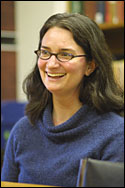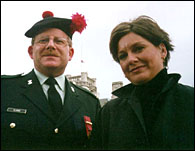Kaleidoscope
Erica Burnham: Building a healthy library
 PHOTO: Owen Egan
PHOTO: Owen Egan |
|
Do a Google search on Erica Burnham and the profile that comes up is of a McGill-trained librarian who's done lots of online information gathering, critiquing and distributing on health-related issues. She was director of the HIV/AIDS Resource Center at the University of Illinois (Chicago), an editor with NOAH, the New York On-line Access to Health website, then the coordinator of Consumer Health Information of the New York Academy of Medicine.
Then, buried among a slew of health-related web pages, there's Erica Burnham, at the Macdonald Campus Library.
So what brings a health sciences librarian in New York up to Montreal to head up an agricultural and environmental sciences library? Well, home -- Burnham has long roots in the city on her mum's side -- and she likes the city's attitude.
"Work and play are given equal priority here and sometimes play is given even greater priority," says the 31-year-old who lives a stone's throw from one of the city's great playgrounds, St. Denis Street.
Furthermore, the position at the Macdonald Campus was a rare opportunity in Canada to work as an academic librarian. No such opportunities were around four years ago when she graduated. Besides which, when she came for her interview last November, Burnham found the campus "beautiful, the trees, the water, everything. And the people were relaxed here."
As for the matter of getting to know the information needs in agricultural and environmental sciences, Burnham isn't worried. "I didn't know much about medicine either before going to Chicago," she notes. Alongside two Canadian novels, Michael Ondaatje's Anil's Ghost and Alistair MacLeod's No Great Mischief -- "I'm catching up on my Canadian lit" -- Burnham is reading Eric Schlosser's Fast Food Nation, "a pretty gripping account of the marketing and production of fast food and how much people eat."
Still, what Burnham has been hired to do at the Macdonald Campus Library seems a far cry from her experience. In a nutshell, she has the daunting task of getting to know the research and curriculum needs of the campus, doing a major triage of a largely out-of-date collection of books, mastering Banner and, most importantly, working with faculty, students, donors and architects to come up with a plan for a revitalized library.
Burnham, however, is only slightly daunted. In fact, it was her "enthusiasm and the fact that she seemed to thrive on new challenges" that impressed Paula Ribeiro, professor at the Institute of Parasitology and member of the library's hiring committee.
Sitting in the rare books room of the Barton Building, a former apple barn converted into a library in 1979 (when the Macdonald College Library -- as it was then known -- had to vacate the premises it shared with John Abbott CEGEP), Burnham looks and sounds serene. She's happy to have a pine tree outside her office window and a big project on her plate.
As for overseeing a major overhaul of the library, Burnham sees that as part of the librarian's territory. "Using library space properly is part of every librarian's job. Lots of libraries are now 25 years old; there was money then, and now it's time to renovate.
"Our biggest need is for group study areas," says Burnham. "There's nowhere on campus where students can get together to work on projects except in the lobby of the Macdonald-Stewart Building. The fact that students now have many projects demanding collaboration changes the nature of the library, where you're supposed to be quiet."
Burnham is also adamant that her library have "a real entrance." At the moment, students have no choice but to enter through the basement connected to Macdonald-Stewart. "It's not obvious that this is a library. The sign outside just says 'Barton Building.'"
Like many libraries, the Macdonald Library faces the problem of students believing that they can do all their research on the Internet. "I think libraries have a big role to play in teaching information literacy," says Burnham, whose aunt and grandmother were both librarians. "Many students just don't understand the concept of research, using primary and secondary sources, and there's not necessarily anyone teaching them. So, it's fallen to libraries."
Which is fine with Burnham. Whether the subject is HIV, farm safety or genetically modified organisms, "people have a right to know," she believes. "The information is there but they need to know how to get it."
 |
||||
|
We have this beautiful empty space.... We could open it tomorrow. The only thing that's missing is the government saying, 'You can go ahead.' |
||||
Farewell to royalty
 Robert Clarke and Canada AM's Lisa LaFlamme
Robert Clarke and Canada AM's Lisa LaFlamme |
|
Most Canadian fans of the Queen Mother watched her funeral on TV. Robert Clarke, management librarian and special libraries coordinator, decided to go to London to pay his respects to a woman he once dined with at Clarence House, her home.
Clarke is a longtime member of the Black Watch, of which the Queen Mum was the Colonel-in-Chief. "I came in at 14 years old as a cadet, and the Queen Mother was part of the ethos of the regiment. Her brother had been in the Scottish Black Watch, there was a close connection there."
In 1978, the Commanding Officer of the Black Watch and his wife were going over to present themselves to the Queen Mother, and Clarke was on his staff. The officer said, "If you can write yourself into it, and get on the military plane, you can come." Once there, the QM's private secretary insisted Clarke join the merriment.
So how did Clarke feel being in the presence of royalty, under the royal gaze of such beautiful blue eyes? "I kept my mouth shut, mostly! I was 23 years old and there by the luck of the draw." When pressed, he recalls he ate "some kind of chicken dish with a cream sauce.
"She was very gracious, and she had a twinkle in her eye when she spoke to me. She was very interested at the time about my years at McGill as an undergrad and recalled her thoughts of McGill from the 1939 royal visit," Clarke recalled. "She was very much a people person. Pleasant, very interested in young people."
The following year in Canada, Clarke was presented to her at a state dinner. Sharp as a tack, she said, "How are you? Good to see you again." Their paths crossed twice after that during her Canadian visits.
Fast forward to London in April, where Clarke was interviewed outside Westminster Hall by Lisa LaFlamme for Canada AM ("she was very nice, a good sport"). The line-up to pay respects was lively. People were yakking, bobbies were in good humour. Despite media hype of many-hours-long waits, Clarke says he lined up for only 90 minutes before entering the hall, going through a metal detector and a personal belongings search. "You could hear a pin drop. There was just the sound of feet shuffling and the occasional throat clearing of the guards.
"There was no rush. It was naturally orderly inside, they let you take your time."
The vigils posted at the casket changed regularly. When Clarke filed past, four Beefeaters were standing silently, wearing their trademark gold-trimmed red tailcoats and plumed hats. As impressive as the ornate Beefeaters were, Clarke was sad to miss the time when the four grandsons arrived to stand vigil.
He felt "kinda sad, but not sorrowful." Clark could discern the mark of the Queen Mother's decisions in the procession. She specified that Princess Anne march in the parade, and that lots of young people be involved.
"I wanted a sense of closure. She was somebody who epitomized what's right, the proper way of living," Clarke says. "My friends say I'm kind of old-fashioned to feel that way. It's hard to put into words.
"She'd done a lot in her time. You never heard a bad word against her -- she was everybody's gran."
 |
||||
|
[Young people] feel their quality of life has been impinged on by the need to constantly use condoms. Condom usage is waning because of the ridiculous notion that some people have that they don't need to protect others or, in some cases, protect themselves. |
||||

